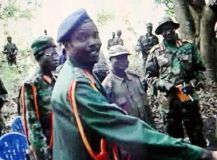Ugandans wonder if Sudan talks offer chance at peace
June 23, 2006 (GULU, Uganda) — Pit latrines hum with flies barely a meter (yard) from crowded mud hut homes. Women line up for hours to get fresh water from a bore hole, their young children playing in the puddle surrounding it. Men sit around listlessly. A drunkard staggers by.
 Conditions in Unyama may be bad, but those who fled here from their rural homes and farming livelihoods fear what lies outside is worse. For the past 20 years, Lord’s Resistance Army rebels have led a brutal insurgency, killing, maiming, looting civilians and kidnapping children in northern Uganda. Some 2 million people have fled to the relative safety of camps like Unyama, which are patrolled by the Ugandan army.
Conditions in Unyama may be bad, but those who fled here from their rural homes and farming livelihoods fear what lies outside is worse. For the past 20 years, Lord’s Resistance Army rebels have led a brutal insurgency, killing, maiming, looting civilians and kidnapping children in northern Uganda. Some 2 million people have fled to the relative safety of camps like Unyama, which are patrolled by the Ugandan army.
Now, there is a glimmer of hope. Last month, the LRA’s shadowy leader, Joseph Kony met with south Sudanese Vice President Riek Macher, who has offered to mediate, and said he was willing to talk peace.
The move has met a mixed reaction in Gulu, once considered the epicenter of the conflict. While the Ugandan government has said it is prepared to enter into negotiations, it has not yet dispatched a delegation to Juba, the south Sudanese capital where an LRA delegation is waiting.
Many are skeptical the political will exists on either side to make the talks successful.
“We want the government to reach out to the rebels. They have killed us, they have mutilated us, they have burned our villages, they have abducted our children. But they are our people and we do believe that there is no better way to create conditions for a reconciled society than to create some kind of dialogue,” said Norbert Mao, a top local government official.
“But I think the government would rather see Kony dead. Here is a man that has eluded them for years and he is definitely a thorn in the side of” President Yoweri Museveni, Mao said.
Kony has no known political agenda other than toppling Museveni’s government and replacing it with one based on the Bible. His fighters are the remnants of a northern rebellion that began after Museveni, who is from the south, took power in 1986.
The atrocities committed by the LRA are not just an issue for Uganda. The conflict has spilled into neighboring southern Sudan and Congo. Last year, the International Criminal Court indicted Kony and his top four commanders for crimes against humanity and issued warrants for their arrest. The court has pressed Sudan and Uganda to arrest Kony, not sit down at peace talks with him. It was unclear whether Kony would participate in the Sudan-mediated talks and his current whereabouts were unknown.
Uganda’s defense spokesman, Maj. Felix Kulayigye, told The Associated Press Thursday that Uganda was willing to negotiate a peace deal for northern Uganda, but would not talk to those indicted by the international court.
“The indictees will face international law. It would be illegal for Uganda’s government to sit down and discuss with the indictees,” Kulayigye said.
Sam Kolo, a former LRA spokesperson and commander, spent many years in the bush as one of Kony’s right-hand men. He was involved in failed peace talks with government appointed mediator Betty Bigombe and later surrendered to the government side and was granted a government amnesty.
“Kony coming to these peace talks seriously is a dream,” Kolo told the AP. “He is an opportunist who wants to strike gold. Peacemaking is business now, donors will listen to you if you say you are prepared to talk peace.”
During the meeting with Sudan’s Macher, which was filmed, the Sudanese vice president handed Kony US$20,000 (about A16,000) telling him to buy food, not guns. Macher told the AP Thursday gave Kony the money and stocks of food to ensure that his rebels would leave Sudan without plundering more villages.
“The money being spent on these peace talks is being wasted and should instead be spent on the camps here,” Kolo said.
The Ugandan army claim to have defeated the LRA militarily, pointing to the apparent retreat of the group into Congo and southern Sudan. But the civilian population in the north — 90 percent of whom live in camps — remain unconvinced.
“The rebels were attacking my village almost daily,” said Unyama resident James Ocitti. “They killed my daughter and my young son with axes as they were trying to run away. They took all our crops and then burnt our house. I had to come to Unyama to save my life and to save my other children.”
Camp life, though, is bleak, the 44-year-old Ocitti acknowledges.
“There is no work to do, no money to earn. We are powerless.”
For many Unyama residents, the potential for renewed peace talks is the only hope they have of returning to their homes, growing their own food once more and offering a future to their children.
“The war is not working, we are tired of the war,” said Florence Adong, who has lived in Unyama for 10 years. Adong’s two young children were taken by the rebels during a raid on her village in 1994.
“The government should go to these peace talks, they owe it to us to try,” she said. “Kony should be offered amnesty and then our children can come home. I pray that talking to Kony will bring peace this time.”
(ST/AP)
